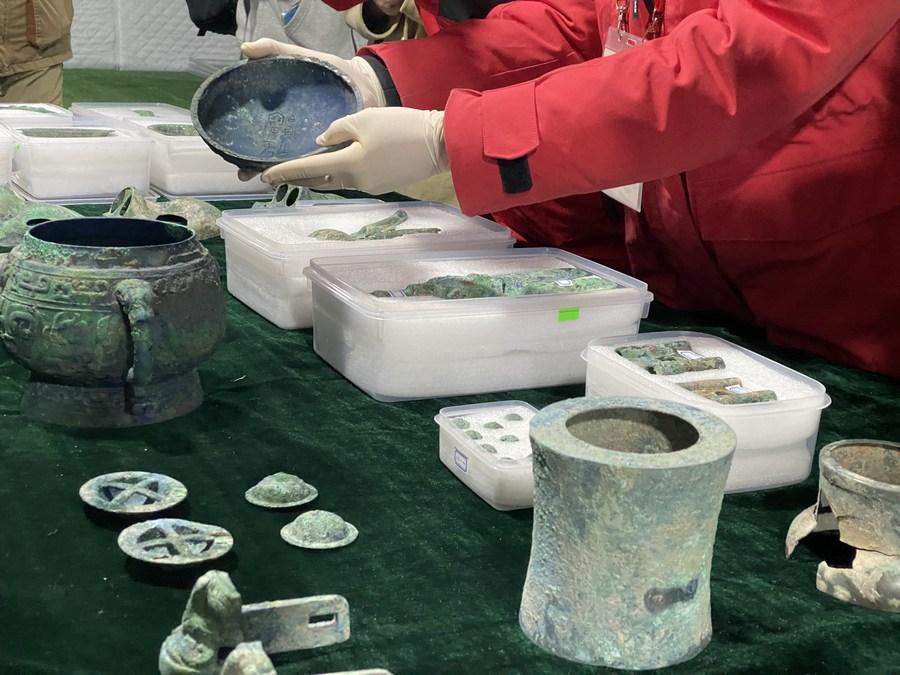
 0 Comment(s)
0 Comment(s) Print
Print E-mail China Daily, December 11, 2023
E-mail China Daily, December 11, 2023
A research center that will combine archaeological efforts from Beijing, Tianjin and Hebei province in the study of Yan culture and its influence, dating back thousands of years, was inaugurated in Beijing on Sunday.

An archaeologist displays a relic unearthed at the Liulihe relic site in Beijing, capital of China, Dec 7, 2021. [Photo/Xinhua]
The Research Center for Archaeology of Yan Culture was established by the Institute of Archaeology at the Chinese Academy of Social Sciences, the National Centre for Archaeology, the Beijing Institute of Archaeology, and the Hebei Provincial Institute of Cultural Relics and Archaeology.
Lei Xingshan, the head of Beijing Union University and director of the center's academic committee, said Yan culture refers to the culture of the Yan state, which was established as a vassal state in the Western Zhou Dynasty (c. 11th century-771 BC) and fell in 222 BC, the year before Emperor Qinshihuang unified the country and established the Qin Dynasty (221-206 BC).
The scope of Yan culture covered what is now Beijing, Tianjin and Hebei province, and it had close cultural links with the Loess Plateau to its southwest and the Mongolian Plateau to its north.
"Yan culture was the most symbolic culture in Beijing, Tianjin and Hebei during the Zhou Dynasty (c. 11th century-256 BC). Studies on Yan culture are an integral part of our research on the Chinese civilization," Lei said at a ceremony marking the founding of the center.
Cheng Jianhua, deputy secretary-general of the Beijing municipal government, said: "Beijing, Tianjin and Hebei are geographically adjacent, with close interpersonal relationships, regional integration and shared cultural heritage. The common natural and human environment in this area has nurtured the shared Yan culture."
Discoveries in the area have revealed details of Yan culture to archaeologists. For example, the Liulihe site in Fangshan district, Beijing, has been proved to be the capital of the Yan state in the Western Zhou Dynasty. The Yan Xiadu site in Baoding, Hebei, was the capital of the Yan in the Warring States Period (475-221 BC).
Lei said he hoped that collective efforts from the three places will promote research into Yan culture.
In the past, studies of Yan culture were rare and separate, and researchers did not have the opportunity to communicate with each other, and so work was often repeated. They sometimes had no access to documents from other places, which hindered further study and the overall understanding of Yan culture.
"Starting with the establishment of the center, efforts will be made to promote the coordinated development of the Beijing-Tianjin-Hebei region," said Guan Qiang, deputy director of the National Cultural Heritage Administration. "This includes promoting scientific research cooperation, resource sharing and policy reforms for talent communication."
The goal is to build the center into a top-level platform for academic research, talent cultivation and cultural exchanges, he added.
Following the ceremony, a forum was held to elaborate on the latest archaeological discoveries in Beijing, Tianjin and Hebei.
Wang Jing, a researcher at the Beijing Institute of Archaeology, said the inscriptions on a bronze drinking vessel unearthed at the Liulihe site in recent years further proved Beijing has a history of more than 3,000 years as a city.
The inscriptions taibao (the title of Shaogong) and yongyan (the building of the Yan capital) mean that Shaogong, or the duke of Shao, a high-ranking official of the Western Zhou Dynasty, visited the place and built the Yan capital there, Wang said.
It matched historical records, and proved that Liulihe was the early Yan capital built by Shaogong, and the earliest known city ruins in Beijing, she said.
Go to Forum >>0 Comment(s)